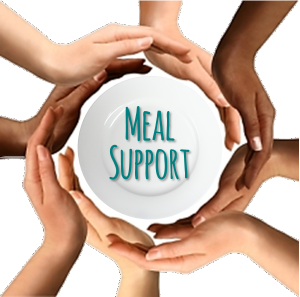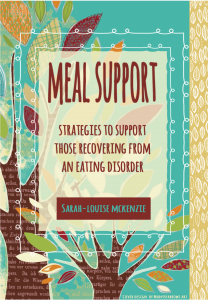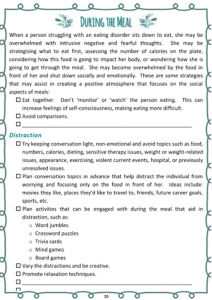 What is Meal Support?
What is Meal Support?
Broadly speaking, meal support is the emotional and practical support provided to a person struggling with an eating disorder before, during and after meals. The breadth and depth to which meal support is provided varies depending on the individual’s stage of recovery and motivation for change. I have written a booklet (Meal Support – Strategies to Support Those Recovering from Eating Disorders) that is designed to be utilised in collaboration with the individual seeking recovery and the person providing support, to identify particular needs and strategies for meal completion and recovery. Most sections therefore, have check-boxes and blank lines where the individual seeking to recover from an eating disorder can indicate where she is at, what would and would not be beneficial, and what they need from you. However, it is important to bear in mind that meal support is more than just about food and eating, it is about being beside someone as they battle for recovery and what matters most to them.
Am I Ready to Provide Meal Support?
Part of providing meal support is being able to act as a role model for healthy eating. An individual with an eating disorder is most likely to be acutely aware of the way in which you relate to food and weight. The person you support may look to you to gauge how relaxed, confident or anxious you seem whilst eating*. They may also use you as a model from which to imitate eating behaviours, pace, and portion sizes. What you say during meal support is important but equally important is how you are. Before you begin, it may be worthwhile to consider what your own relationship with food/weight/your body is like and whether you feel ready to provide meal support.
Some recommendations for role-modelling include:
- Eating with the individual to reduce feelings of self-consciousness.
- Avoiding ‘diet’, ‘light’, and ‘low-fat’ foods.
- Eating normal amounts of food.
- Eating a balanced meal (i.e., three to four food groups at a meal).
- Eating sufficient food at snack-times.
- Demonstrating appropriate eating habits.
- Maintaining an attitude where food is neither good nor bad. Eating a balance of different foods is important.
* Auckland Eating Disorder Service 2008, Meal Support, Auckland District Health Board, Auckland, New Zealand.
What Does NOT Help
What does NOT help will vary from individual to individual and it would be worth having a conversation around this topic, but here is a list of commonly unhelpful tactics.
- Being forced/coerced to eat. The support person resorting to trying to convince or coerce the person with an eating issue to eat when they are not yet ready, may result in a battle which may be harmful or damaging to the relationship. Readiness for change may fluctuate, this is normal, so it is important to maintain open and honest communication. Meal support is increasingly effective as the individual struggling with the eating disorder and their support person partner together against the eating disorder – not each other.
- Guilt tripping
- Lecturing on the dangers of eating disorders
- Eating in public in the early stages of recovery
- Making critical or hostile comments e.g. ‘Why haven’t you eaten it all?’ ‘What a waste!’, ‘Come on, you have not finished that bit, time is running out and I’ve got things to do, get on with it.’ ‘Think about the children in Africa.’*
- Talking about food, sensitive therapy issues, weight, exercise, violent current events and previously unresolved issues is not helpful during meal support.
- Eating diet foods during meal support
- The support person having a fear of food
- Talking about some foods as ‘bad’ and others as ‘good’
- Demonstrating your own concerns about weight or body image
- Having painful thoughts and feelings brushed aside. It can feel shaming and embarrassing to have feelings ignored e.g. ‘Don’t be silly, of course you don’t need to be scared of that!’ or ‘You are being ridiculous!’.*
* Auckland Eating Disorder Service 2008, Meal Support, Auckland District Health Board, Auckland, New Zealand.
The Meal Support book explores these and a whole range of other relevant issues. I really encourage you to get hold of it as it is a great resource to assist you and the loved one you are supporting in your journey together.
What topics does the book (Meal Support: strategies to support those recovering from an eating disorder) cover?
♦Introductory Considerations ♦Understanding Change ♦What is Meal Support? ♦Assessing Readiness ♦What Does NOT Help ♦Communication (What Not to Say, Examples of What to Say or Do) ♦Goals for Meal Support ♦A Word on Food ♦RAVES model ♦Areas of Support ♦Safe and Challenge Foods ♦Establishing Mealtime Guidelines ♦Before the Meal – Planning and Preparation (Environment, Structure, Meal Preparation, Serving) ♦During the Meal (Distraction, Coaching and Reassurance, Useful Phrases, Addressing Disordered Eating Behaviours, Questions to Ponder) ♦After the Meal – Post Meal Support (What to Expect – Physical Symptoms, What to Expect – Psychological Effects, Distraction) ♦Coping Strategies (Coping Strategies for Dealing with Intrusive Thoughts, Coping Strategies for Dealing with Intrusive Images, Coping Strategies for Dealing with Unpleasant Feelings) ♦Specific Challenges –RAVES, Eating in Public, Relapse Concerns (Warning Signs, Triggers, Action Plan, Other Things I’d Like You to Know or Do to Support Me) ♦Self-Care for Support People ♦Words from Various Support People (From 2 Fathers, From 2 Mothers, From a Partner, From a Sibling, From a Friend) ♦Concluding Thoughts ♦Eating Disorder Services Directory
Look Inside ⇓ ‘Meal Support: strategies to support those recovering from an eating disorder’…
Click on the images below to read the Contents – Preface and Pages 20 – 23…




